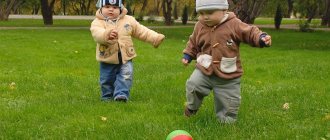Personality is...?
Personality is a concept that is a social characteristic of a person.
The qualities that determine the uniqueness of a particular person are formed under the influence of relationships with surrounding people, under the influence of processes occurring in society. Each social system shapes a person’s personality through education - a process with clearly defined goals and thought out to the smallest detail.
Read further: Personal development in society
To become an individual, a person must learn social experience and, on the other hand, give his contribution to society within his means. At the same time, he reveals and demonstrates his qualities inherent in him by nature and formed by society through upbringing. In the process of human development, his spiritual, mental and physical characteristics move from quantitative changes to qualitative ones.
Social characteristics of a person
Man as a social individual has an inextricable connection with society. He can be considered part of society only when entering into social relationships, such as communication, engaging in work or creativity, or participating in the surrounding social life.
Among the main social factors of human development and life:
- articulate speech - humans are the only biological species that can speak it;
- logical and analytical thinking;
- need for social interaction;
- cultural and spiritual development;
- ability to build and create tools for work;
- ability to adapt and learn.
Thanks to the ability to work, man was able to develop the skills of thinking and communication, subsequently creating a primitive society.
Modern basic social qualities of a person lie in the ability to comprehend and interpret the world around him, expressing his vision through consciousness, speech, art, mental and physical work.
Upbringing and the influence of the surrounding world shape the behavior and personality of a person, which is also influenced by society, state, religion, personal opinion and worldview acquired during evolutionary development.
Human society is distinguished by its ability to accumulate, preserve and transmit experience and information received from outside and pass it on from generation to generation.
In addition to adapting to the environment, man also knows how to change it to suit his needs: cut down forests, cultivate the land, build houses and factories, make food and clothing. All human activity is based not only on instincts, like in animals, but on the ability to model, plan and analyze the fruits of one’s actions.
Conditions affecting personality
There is a direct connection between the process of social development of an individual and its result - this development depends on external and internal conditions.
Internal conditions are the inherent mental and physical characteristics of the organism.
External conditions are the social environment surrounding a person.
The essence of a person, given to him by nature, is capable of changing in the process of interaction with society. As a result, new relationships begin to form, and these, in turn, lead to new changes.
Read further: 11 factors that have a negative impact on a person’s personality
Biological characteristics of humans
As a biological individual, a person has characteristics that make him similar to other species: the desire to procreate, differences in age and sex, the need for nutrition, breathing and sleep, heredity, the presence of reflexes and instincts, stereoscopic vision, a similar internal structure of the body, the ability to adapt to different environmental conditions.
In addition to general biological features, there are important distinctive features:
- the presence of moral and psychological qualities (character, imagination, emotions, thinking, memory);
- complicated structure of the hands and their mobility, ability for fine motor skills;
- special structure of the brain and structure of the skull;
- ability to stand and walk straight;
- lack of dense wool;
- developed speech apparatus.
Since nature relies on purely physical factors, philosophy considers spirituality and the presence of a soul to be the main difference between humans and the rest of the animal world.
Personality formation is a social process
A person’s personality is formed not only under the influence of biological characteristics, but also under the influence of socialization. This process occurs sequentially, it necessarily follows certain stages, which, despite minimal differences, are still similar in all representatives of the human race. Our perception of the world depends on the kind of education we received at the time.
Socialization is a person’s entry into society, joining its systems.
The social process of personality formation begins already in the first year of an individual’s life. The child distinguishes the roles of those who surround him: relatives and strangers, parents and strangers, grandparents and educators. He gets acquainted with the norms and orders accepted in society, learns to live in accordance with them.
A significant moment in this social process is when a child tries on the role assigned to him in society and identifies himself with it:
- "I am a boy (girl)"
- “I am a student (schoolboy, first grader)”,
- “I am a daughter (son, grandson),” etc.
Further development is determined by the attitude of the emerging personality to his calling, to the world around him, to a certain way of life.
The main emphasis in the formation of a teenager’s personality is the choice of profession, the personality of boys and girls and older people is the creation of such a social unit as their own family.
Although personality can be formed throughout life, this social process can be considered to be completed when the individual has realized his role in the world. If for some reason one of the stages is missed, this can lead to unpleasant consequences for the individual. For example, ignoring sex education at an early age brings problems with gender identification.
Read further: Psychology of personality development - 5 stages of human development
The formation of personality is influenced by such social institutions as:
- family,
- kindergarten, school, university, technical school,
- clubs, interest clubs, sports sections,
- team of employees,
- own family,
- media, internet.
They are joined by culture, the political situation in the country, and the institution of public opinion.
Let's consider what such a social structure of society develops in a person?
Nursery, kindergarten - primary social development.
Nurseries and kindergartens - first of all, develop a person’s communication skills with his peers, mastering his body, developing various skills related to motor movements, mastering various hobbies and new knowledge. By constantly comparing ourselves with others, we learn to separate the boundaries of where I ends and NOT ME, MINE and NOT MINE begins. After all, if a child takes someone else’s because he liked it, he is taught that this is wrong, a peer may fight with him, taking his own by force. We learn the laws of society, in particular “thou shalt not steal,” from the age of a child. In this way, human social development or social man is formed.
School and human social development.
Going to school, we place more emphasis on learning the information of the surrounding world, its laws, formulas, rules and foundations. And in kindergarten and at school and at any level of social structure, we know and feel for ourselves when we do something right - in the form of a good grade, the approval of others, praise, a salary increase; and when we do something wrong - receiving low grades, scolding, blame, disapproval, condemnation and even punishment. All this serves to cultivate in a person certain qualities that society cultivates in every person, which at the moment in the development of society are considered high, correct, moral and worthy of imitation.
Social education as a process of personality development
Education is changing a person in a direction given by society, satisfying the needs of society through this process. With its help, the social and historical experience of society is transmitted to the new generation, the personality is purposefully formed in order to prepare it for life in society and for work for the benefit of this society.
Social education is the purposeful activity of society to form an individual who has a worldview, life aspirations, moral and aesthetic attitudes that fit into the framework accepted by this society.
The essence of social education:
- Introducing the individual to the values of culture, art, literature, morality;
- Individualization of personality, development of one’s “I”, conscious traits and principles of behavior.
This process does not stop throughout human life. “Everything flows, everything changes,” said the classic, our world is constantly moving, and a person, in order to maintain his own comfort, has to adapt to the demands of society. The essence of a person cannot be frozen; it changes over the years. Since man is a social being, life in society requires constant adaptation and continuous change.
Phases of personality socialization:
- The individual internalizes social norms and values;
- The personality strives for self-actualization, to influence other members of society;
- The individual integrates into a social group, in which his capabilities are revealed.
The stages of social development of an individual in the modern interpretation may have several different options, depending on what parameters underlie qualifications. Stages of personality socialization depending on age:
- Childhood is where about 70% of the personality traits and qualities are laid, as well as the foundations of socialization. Here the understanding of one’s own “I” naturally occurs.
- Adolescence - the formation of personality is accompanied by rapid changes in physiology, the volume of responsibilities assigned to a person increases sharply.
- Early maturity (youth) - the individual faces a decisive choice, deciding which layer of society to join, because he chooses a social society for a long time.
- Maturity (the period lasts 30 years before the crisis) – the formation of such aspects of socialization as labor relations and personal life, love, friendship occurs. A person makes up his own opinion about himself based on the perception of the sexual aspects of life and labor relations.
The essence and specificity of socio-cultural development of personality
One of the important processes in the socio-cultural development of the individual is the unification of education and culture, which involves a focus on educating a “person of culture” capable of creative self-realization in a sociocultural situation. The main values of person-centered education are:
– man as a subject of education;
– culture as an environment that grows an individual personality;
– creativity as a way of human development in culture [3].
A personality is a person who has reached a certain level of development, has consciousness and self-awareness, and is capable of independent transformative activity.
The originality of a person is formulated as “individuality,” where dignity is manifested, which consists of the emotional, intellectual, and volitional spheres in several areas or types of activity at once. The individuality of the individual is especially manifested in the conditions of socio-cultural activity, where all aspects of the personality develop: intellectual, moral and emotional. In essence, socio-cultural activity operates in leisure conditions, where the most important quality of a person is the will, which allows, based on a need, motive or goal, to develop both the biological and social components. Consequently, the personality is both an object and a subject of socio-cultural activity, since in these conditions the development of the personality comes from the diversity of its connections with other people, from an active attitude towards life. The functioning of the individual as an object of socio-cultural activity is influenced by several processes that develop into various relationships: political, economic, labor, creative, recreational [2].
In the process of development and socialization, a child develops a certain picture, a model of the world. As L. S. Vygotsky notes, the process of cultural development can be characterized as the development of the child’s personality and worldview. In this process, a system of social and moral ideas, aesthetic ideals, and values reflected in art and life is formed. In the process of development, social ideas and images are not simply assimilated by the child at the cognitive level, but are appropriated and transformed into the content of his personality as a subject of culture. Any child, when he reaches a certain age, finds himself placed in the corresponding social position accepted in society, despite his individual development and degree of psychological readiness. Thus, he falls into the system of objective conditions, where his character and activity at a given age stage are determined [1].
By development, Kharlamov I.F. understands the interconnected process of quantitative and qualitative changes that occur in the anatomical and physiological maturation of a person, in the improvement of his nervous system and psyche, as well as his cognitive and creative activity, in the enrichment of his worldview, morality, social political views and beliefs [4]. Development manifests itself as progressive complication in the transition from simple to complex, from ignorance to knowledge, from lower forms of life and activity to higher ones.
Speaking about personal development, one cannot consider a person as a passive object of environmental influence and educational influences. Her creative transformative activity always plays an active role of the individual herself. Considering the internal active position of the individual to environmental and educational influences, formation can take place in a variety of directions.
For example, if a student has an unfriendly attitude towards influences, he will develop in the direction directly opposite to that towards which the teacher directs him. Therefore, education should have a positive effect on the internal stimulation of the individual’s activity in working on himself. After all, in the end, personal improvement and a person’s own desire determines his development.
The process of personality development, under the influence of external factors, essentially takes on the character of self-development. Self-development stimulates internal activity in working on oneself through a positive response from the psychological internal sphere, that is, under the influence of educational and social factors. It doesn’t matter what stage of development a particular society is at, the main thing is that personal development is determined through cultural experience, which is common to all humanity.
Thus, each child, through feedback from elders, learns to communicate through language, gains experience in the use of punishment and reward, and also masters some other most common cultural patterns. Moreover, each society gives virtually all its members some special experience, special cultural standards that other societies cannot offer. From social experience, common to all members of this society, a corresponding personal configuration appears, common to a large number of members of this society.
The formation of personality is influenced to a certain extent by biological reasons, as well as by the reasons of the physical environment and general cultural standards of behavior in a certain social group. But it should be noted that the main factors that determine the process of personality formation are certainly group experience and personal, unique experience. These reasons completely appear in the process of socialization of the individual.
The famous American psychologist and sociologist Charles Cooley set the task of studying the process of a person’s gradual awareness of the difference between his own “I” and other personalities. As a result of countless research works, he determined that the development of the idea of one’s “I” occurs in the course of a long, ambiguous and confusing process and cannot be carried out without the participation of other individuals, that is, without the social environment. Each person, according to Charles Cooley, builds his “I” based on the reactions he perceives of other people with whom he comes into contact. For example, from childhood, a grandmother observed her grandson’s interest in creativity (music, choreography); he heard the rhythm and confidently moved to the beat of the music. She just told him: “You will become a famous artist and dancer, I believe in you.” Thus, she instilled confidence in him, and if these statements are repeated often enough, more or less constantly and by different people, then the grandson ultimately feels like a professional in his field and acts as an independent creative person.
Similar thoughts led Charles Cooley to the idea that the personal “I-image” is not born only in connection with impartial facts. The most ordinary child, whose efforts are appreciated and rewarded, will feel confident in his own abilities and talent, while a truly capable and gifted child, whose efforts are perceived by those closest to him as bad, will feel a painful sense of illiteracy, and his capabilities may be limited. actually unjustified. It is through relationships with others, through their assessments, that each person determines whether he is smart or stupid, attractive or ugly, worthy or useless.
So, the process of personality development occurs under the influence of group experience. With all this, a person forms his own “I-image” based on the perception of what others think about him and how others evaluate him. In order for such awareness to be successful, the individual takes on the roles of others and through the eyes of these others looks at his behavior and his own inner world. By forming his “I-image”, a person is socialized. But there is not a single similar process of socialization and not a single similar personality, due to the fact that the personal experience of each of them is unique and inimitable.
Of course, cultural consciousness plays a big role in the formation of personality. It most often develops spontaneously: a person imitates his elders from childhood, learns to follow certain rules of behavior, and assimilates the value system that is characteristic of the culture of this society. This process ensures the reproduction of a particular culture and its continuity. However, in order for a person to master culture, a fairly consistent action on the person from a very early age is necessary. And here we meet with the Institute of Education.
In different sociocultural situations, the education process takes different forms. In spontaneous education, a personality is formed not so much by periodic and calculated action, but by a specific example, comments on various occasions. Such upbringing cannot be called completely unconscious, because every educator keeps in mind the set of cultural and psychological characteristics that he wants to see in the pupil. There are three features of such education:
Firstly, it usually applies to a child, adolescent, young man or girl. Raising an adult is usually no longer necessary or possible.
Secondly, under this system, the teacher in most cases consciously or unconsciously strives to shape the student’s culture in his own way and likeness, that is, he instills in him the system of values that he himself lives by.
Thirdly, education is conducted in the interests of the student. The purpose of such education is to prepare the young man for life, to make him happy and successful. But it often happens that the interests of the pupil are misunderstood, and, as an adult, he will not say “thank you” for such upbringing.
So, the process of cultural formation of personality and the corresponding type of education is a spontaneous process, and cultural consciousness in the development of personality is the possibility of upcoming socialization and development beyond the boundaries of social norms.
Thus, the result of the socio-cultural development of an individual depends on the consistency of the action of factors of heredity, environment and upbringing. An important role is played by the creation of criteria during the initial life of a person for his transition to a more perfect state, in which his individuality and capabilities are revealed, methods of mastering cultural means, forms and methods for his assimilation of values, norms, attitudes, patterns of behavior.
The socio-cultural development of the individual is an intensive process of a person’s entry into the system of social relations on the basis of internal, personal assessments and external, behavioral manifestations that are formed in the conditions of the individual’s assimilation of cultural values and social norms of the surrounding socio-cultural space.
Socio-cultural development is the ability of an individual, developing in a team, to take independent, purposeful, active step-by-step socially significant actions based on his deep involvement in social values, the formation of his moral and business character, conscious and responsible behavior and activities. The structure of the socio-cultural development of the individual is made up of motivational-volitional, procedural-activity, reflective-evaluative components, which also represent a special type of development aimed at improving the activity and behavior of the individual.
Literature:
- Vygotsky L. S. Collected works in 6 volumes. T.1. - M.: Pedagogy, 1982.
- Zharkova A. A. Development of the personality of a participant in socio-cultural activities based on a paradigmatic approach // Text of a scientific article in the specialty “Education Sciences”. - 2011. - No. 2.
- Ilyina V. A. Development of a child’s personality. / U-Faktoria Publishing House, 2006
- Kharlamov I. F. Pedagogy. 4th edition, revised and expanded. - M.: Gardariki - 2003. - 520 p.
Examples of personality socialization
We figured out why socialization of the individual is so important and how it develops; the examples above illustrate the process at different stages.
In order to better understand the essence of socialization, I will continue to highlight the significance of this process at different stages of life.
Knowledge of social norms does not always guarantee compliance with them. A criminal steals and takes someone else’s property not because he doesn’t know that this is not contrary to the law. It’s just that the norm “you cannot appropriate someone else’s property” was not adapted and did not become the norm of this person’s behavior.
The socialization of a child begins from the first days of life. Parents try to instill certain skills in their child, teach him to evaluate his own and others’ actions, and behave in society. From birth, young children have no need to brush their teeth, eat with a spoon, clean up after themselves, or say hello to adults. But gradually such actions become the baby’s habit, and he already feels the need for them.
If we imagine a unique situation where a person lived his life in the same city, worked in the same team and lived in the same family, this does not mean at all that he will not encounter socialization. Society is constantly changing, and human adaptation occurs constantly. However, with gradual, not abrupt transformations and changes in society, human socialization proceeds slowly. During periods of global and revolutionary changes, the normal social rhythm is disrupted. At such moments, people with strong “old” attitudes and an inflexible psyche may experience psychological problems, discomfort, and confusion.
A person’s life is connected with his social position and the place he occupies in society. Being in society, communicating, people feel more important, needed, express their emotions more easily and do not suffer from loneliness.
Let's turn to the literature. Using the example of the protagonist of a novel about a shipwrecked sailor, writer Jules Verne describes a man who has lived for years in complete isolation and loneliness. Robinson Crusoe experiences different feelings: fear, joy from being saved, freedom and melancholy from lack of communication. To avoid going crazy from loneliness on a desert island, Robinson Crusoe talks to animals, fills out a calendar, and keeps a diary. But nothing replaces his communication with people.
Robinson Crusoe
It has been proven that people living outside society often feel depressed and are prone to depression. People with strong leadership qualities are less able to tolerate isolation and life outside society.
A striking example of the socialization of a child is his presence in kindergarten. Previously, parents simply “dropped” their child to kindergarten. Because everyone had to go to work and because it was customary. Today, a kindergarten or other preschool institution, where children communicate in groups, is assessed from the point of view of the socialization of children.
In a group, a preschooler gets to know people, learns about new concepts, games, patterns, tries on certain “roles”, learns to control his emotions and correctly take a place in the group. A large family and the child’s active communication in the format “with peers in the yard” partly replace attending preschool institutions. However, in single-parent families, only children, or children from disadvantaged families, psychologists recommend that they attend kindergarten.
With an unprofessional approach, disinterest or negligent attitude of kindergarten teachers towards the educational process, desocialization may occur: children cry and do not want to go to kindergarten, the child’s character deteriorates, and bad habits appear. Here parents need to be attentive and not let everything take its course. Kindergarten is just one option among many places where children learn to interact with peers and gain essential social experiences. The well-known expression that “the environment shapes” largely refers to the choice of an educational institution for a child.
It happens that the socialization of both adults and children in a new place is affected by lack of knowledge of the language. If a child does not understand well the speech (language) spoken by his peers, he experiences problems in socialization, and in a group of children he may become an outcast. As an example, children of migrants.
As a demonstration of proactive socialization, I will give an illustrative example. Often, teenagers from economically disadvantaged families or areas strive not to become scientists or artists, but drug dealers. They are usually criticized and accused of lack of motivation. But sociologists explain this phenomenon by the fact that such teenagers have virtually blocked access to the artistic or scientific environment. Therefore, young people reject the norms of this group and begin the process of proactive socialization with more “receptive” communities - they become involved in the processes alongside which their primary socialization takes place. Thus, difficult teenagers pragmatically adjust the opportunities that they have.
As soon as a person understands his gender, gender socialization begins. The right guidelines will help a girl become a woman, and a boy - a man. A simple example is that girls wear dresses and play with dolls, while boys are interested in cars and other “brutal” toys.











